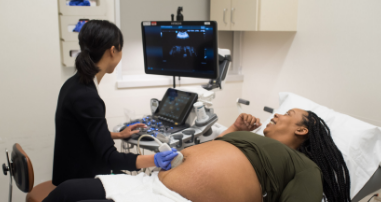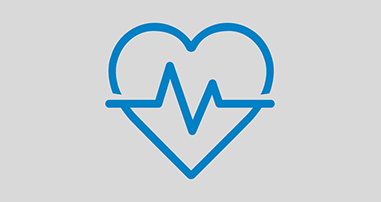Questions to Ask Your Doctor During a Fetal Echocardiogram
A fetal echocardiogram is an imaging test that allows a doctor to observe the structure of an unborn baby’s heart to look for any potential heart conditions.
If you have been referred to a fetal cardiologist for a fetal echocardiogram, we understand you may have a lot of questions and concerns. Our top priority is for you to feel heard. Our Fetal Cardiology Director, Dr. Erik Michelfelder, breaks down some of the most important things you should ask your fetal cardiologist about your baby’s heart, and why it is important to ask them during your appointment.
What is a Fetal Echocardiogram, and Why Do I Need One?
“A fetal echocardiogram, also known as a fetal echo, is a test that uses soundwaves to look at an unborn baby’s heart to see how well the heart is working,” Dr. Michelfelder explains. “Fetal echocardiograms are highly sensitive and able to create detailed images of your unborn baby’s heart so the doctor can take a more detailed look at the heart’s structure and make sure your baby’s heart is functioning the way it should.”
Fetal echocardiograms are performed by fetal cardiologists, who are special pediatric cardiologists with expertise in ultrasound imaging of a fetus’s heart. This means they are able to scan through a mom’s pregnant belly to diagnose congenital heart defects (CHDs) in the fetus. Typically, women are referred to a fetal cardiologist by a maternal fetal medicine specialist if the 20-week ultrasound or anatomy scan shows a possible heart condition in the fetus; the mother, father or siblings of the unborn baby have a history of heart problems; or if the mother has a medical condition or has been exposed to certain medicines that can affect the development of the unborn baby’s heart.

Question 1: Is the heart function normal?
During your fetal echocardiogram, ask your doctor if your baby’s heart is pumping as it should be. Your baby’s heart should be pumping oxygen and nutrient-rich blood throughout the body and back to the heart in a very specific way.
“When it comes to normal heart function, we want to make sure that the two lower pumping chambers in the heart, also known as the ventricles, are pumping hard and fast enough to make sure enough blood is being delivered into the baby’s body,” says Dr. Michelfelder. “There are ways we can measure that to decide if the amount of squeezing is normal or not.”
Learn more about how the heart works.
Question 2: Is the heart rate normal?
Normal fetal heart rate at 20 weeks should be anywhere between 120 and 180. The heart rate can sometimes be a little higher or lower, but most babies will sit between 120 and 180 beats per minute. Any problem in the rate or rhythm of a heartbeat is called an arrhythmia.
“Checking the heart rate can be important because some babies (although very rarely) can develop a condition called fetal tachycardia, which is an abnormally fast heart rhythm that can cause the heart to have difficulty keeping up with the high heart rate,” Dr. Michelfelder says. “If the baby’s heart rate runs too high for too long, it can cause the baby to get sick, even in utero.”
Some conditions associated with fetal tachycardia include:
- Supraventricular tachycardia (SVT)
- Atrial flutter
- Ventricular tachycardia
There are also rare cases where the baby’s heart rate is too low, a condition called bradycardia which can be associated with maternal or fetal conditions that would require some follow up. While it is often temporary and goes away on its own, in some cases, it caused by other conditions, including:
- AV block
- Partial heart block
- Complete heart block
If your baby has an arrhythmia, your pediatric cardiologist will carefully weigh the different treatments available and choose the best one for you and your baby.
Question 3: Do you see all of the heart's chambers?
The heart typically has four chambers. It has two upper collecting chambers called atriums and two lower pumping chambers called ventricles. Each side of the heart has an atrium and a ventricle. On the right side of the heart, the right atrium collects the blue blood that comes back from the body, drops it into the right-sided pumping chamber, or ventricle, and that right ventricle pumps blood through the long artery out to the lungs. And then the same thing happens on the left side—the left atrium then collects that red blood that comes back from the lungs, dumps it into the pumping chamber on the left ventricle, and that left ventricle pumps blood out of the aorta, which is the big red body artery that carries that oxygenated blood out.
If your doctor sees an issue with one of the heart chambers or ventricles, your child could have one of a list of conditions affecting the chambers and ventricles, including:
- Hypoplastic left heart syndrome
- Hypoplastic right heart syndrome
- Pulmonary atresia
- Double outlet right ventricle
- Double inlet left ventricle
- Unbalanced atrioventricular canal defect
Asking your fetal cardiologist if they are able to see the heart’s chambers can help verify that your baby’s heart is functioning as it should. The Single Ventricle Program at the Children's Heart Center specializes in the diagnosis and treatment of conditions affecting the heart's chambers.
Question 4: Are you able to see the great arteries?
The great arteries refer to the two main arteries that come out of each side of the heart. The aorta is the main artery that comes out of the left side of the heart, and it carries the red oxygenated blood out of the left side of the heart and out to the body.
The other great artery is the called the pulmonary artery and is sometimes referred to as the “lung artery.” The pulmonary artery carries blue blood from the right side of the heart to the lungs so that it can pick up oxygen. These arteries ultimately have many little branches, like a giant river that has a million tributaries, but these two main arteries are the are the primary vessels that come out of the heart itself.
“A condition we look for in the great arteries is called transposition of the great arteries, where the arteries are switched,” Dr. Michelfelder explains. “The aorta will come out of the blue part on the right side of the heart, and the lung artery out of the red side of the heart. While it is not a common condition, transposition of the great arteries requires heart surgery to be treated. Confirming that those two arteries come out of the heart normally is part of a fetal cardiac echo ultrasound.”
Question 5: Are the heart and stomach in the correct position?
While the stomach position doesn't impact the function of the heart, abnormal positions of the stomach and the heart can be associated with a condition called heterotaxy syndrome, which can be related to complex forms of CHD. In heterotaxy syndrome, structures in the body that would normally either lie on the right or the left side can sometimes be switched. This means that a left-sided stomach (which is normal) could sometimes sit on the right side of the baby or structures that normally sit on the left side, such as the spleen, are sometimes abnormal or even missing.
Question 6: What are my next steps?
“It's a big deal to have a baby diagnosed prenatally with a heart condition,” Dr. Michelfelder acknowledges. “I always advise families to not be afraid to ask questions in order to get as much information as they need to help make very important decisions about their child's health. There are no bad questions.”
If our team identifies a heart problem, an important part of our process is to sit down with you to counsel you, explain the condition and how it is treated, and carefully explain what this means for your baby.
Some additional questions you should ask include:
- Do I need a special delivery plan?
- Will the baby need any medications to be started after birth?
- Will the baby need any surgery after birth?
- Is this heart program nationally ranked in pediatric heart care?
- How many of these conditions do you treat each year?
We will work with the maternal-fetal medicine specialist and will provide resources so that you can make informed decisions for your family. If your baby’s condition requires heart surgery, we will walk you through every step, from diagnosis to treatment, so you are prepared for the road ahead.
Dr. Erik Michelfelder is a board-certified pediatric cardiologist who specializes in fetal cardiology, congenital heart disease and non-invasive cardiac imaging. Dr. Michelfelder serves as the Director of the Fetal Cardiology Program at the Children’s Heart Center, and as a Professor of Pediatrics at the Emory University School of Medicine.
This content is general information and is not specific medical advice. Always consult with a doctor or healthcare provider if you have any questions or concerns about the health of a child. In case of an urgent concern or emergency, call 911 or go to the nearest emergency department right away. Some physicians and affiliated healthcare professionals on the Children’s Healthcare of Atlanta team are independent providers and are not our employees.
Contact Us 404-256-2593



